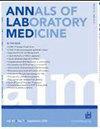Prospective Comparative Evaluation of the Xpert MTB/RIF and Xpert MTB/RIF Ultra Assays for Detecting Mycobacterium tuberculosis and Rifampin Resistance in High-resource, Intermediate-burden Settings.
IF 3.9
2区 医学
Q1 MEDICAL LABORATORY TECHNOLOGY
引用次数: 0
Abstract
Background The Xpert MTB/RIF Ultra (Xpert Ultra) was introduced to enhance the sensitivity of tuberculosis detection, particularly in smear-negative cases, compared with its predecessor, Xpert MTB/RIF (Xpert). However, its performance in high-resource, intermediate-burden settings remains unassessed. We prospectively compared the diagnostic accuracy of Xpert Ultra and Xpert for detecting Mycobacterium tuberculosis (MTB) and rifampin resistance in Korea. Methods In total, 309 respiratory specimens were analyzed using both assays. We used two reference standards: mycobacterial culture and a composite reference standard based on clinical diagnosis and treatment decisions. Diagnostic performance, including sensitivity, specificity, and agreement between the two assays, was assessed. Spiking experiments using 13 MTB isolates with known rpoB mutations were performed to evaluate rifampin resistance detection. Results Xpert Ultra showed increased, albeit not significantly, sensitivity (73.7% vs. 65.8% with culture; 63.8% vs. 53.2% with the composite reference standard) over Xpert. Its specificity was comparable to that of Xpert; however, a few false-positive results were observed among trace- and very low-positives. Among six culture-negative but Xpert Ultra-positive cases, two were clinically diagnosed as tuberculosis. Of the 13 rpoB mutant strains, Xpert correctly detected all mutations in the rifampin resistance-determining region, whereas Xpert Ultra yielded indeterminate results for Q432P and Q429H/L430P/H445Q. Conclusions Xpert Ultra tends to have increased sensitivity; however, it shows potential diagnostic ambiguity associated with trace- or very low-positive results. These findings highlight the importance of clinical correlation, particularly in culture-negative cases. Indeterminate results in certain rpoB mutations require cautious interpretation.Xpert MTB/RIF和Xpert MTB/RIF超检测在高资源、中等负担环境中检测结核分枝杆菌和利福平耐药性的前瞻性比较评价
与之前的Xpert MTB/RIF (Xpert)相比,引入Xpert MTB/RIF Ultra (Xpert Ultra)是为了提高结核病检测的敏感性,特别是在涂片阴性病例中。然而,其在高资源、中等负担环境中的表现仍未得到评估。我们前瞻性地比较了Xpert Ultra和Xpert对韩国结核分枝杆菌(MTB)和利福平耐药性的诊断准确性。方法采用两种方法对309例呼吸道标本进行分析。我们使用两种参考标准:分枝杆菌培养和基于临床诊断和治疗决策的复合参考标准。评估诊断性能,包括敏感性、特异性和两种检测方法之间的一致性。采用已知rpoB突变的13株MTB分离株进行了利福平耐药性检测。结果与Xpert相比,Xpert Ultra的灵敏度(73.7% vs.培养65.8%;63.8% vs.综合参比标准品53.2%)明显提高,但差异不显著。其特异性与Xpert相当;然而,在微量阳性和极低阳性中观察到一些假阳性结果。在6例培养阴性但Xpert ultra阳性的病例中,2例临床诊断为结核病。在13株rpoB突变株中,Xpert正确检测了利福平抗性决定区域的所有突变,而Xpert Ultra对Q432P和Q429H/L430P/H445Q的结果不确定。结论expert Ultra有增加敏感性的趋势;然而,它显示了与微量或极低阳性结果相关的潜在诊断歧义。这些发现强调了临床相关性的重要性,特别是在培养阴性病例中。某些rpoB突变的不确定结果需要谨慎解释。
本文章由计算机程序翻译,如有差异,请以英文原文为准。
求助全文
约1分钟内获得全文
求助全文
来源期刊

Annals of Laboratory Medicine
MEDICAL LABORATORY TECHNOLOGY-
CiteScore
8.30
自引率
12.20%
发文量
100
审稿时长
6-12 weeks
期刊介绍:
Annals of Laboratory Medicine is the official journal of Korean Society for Laboratory Medicine. The journal title has been recently changed from the Korean Journal of Laboratory Medicine (ISSN, 1598-6535) from the January issue of 2012. The JCR 2017 Impact factor of Ann Lab Med was 1.916.
 求助内容:
求助内容: 应助结果提醒方式:
应助结果提醒方式:


